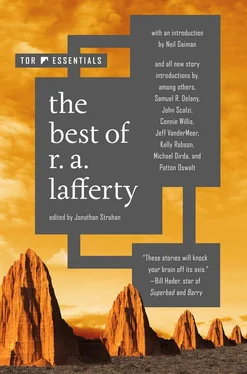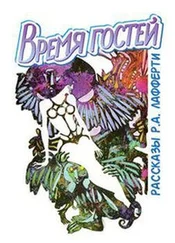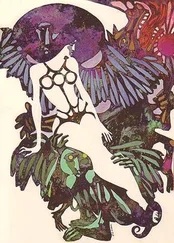“This is the Old Country, and we haven’t left it,” powerful Acmon said. “Everything underground anywhere is part of the Old Country. All hills and mountains of the world connect down in their roots, in their toes, and they make a single place. We are in Mount Ida, we are in Crete, we are in Oklahoma. It is all one.”
They made the pieces. And Oread, dipping the parts out of the white-hot iron as if it were water, put them together to make the thing. It was a new concept-symbol system, and it looked as if it would work.
And it looked much more as if it would work the next afternoon. Mr. Zhelezovitch the instructor was almost out of his mind with it. The graduate students and the regular students (for this was one of those advanced, mixed classes) crowded about it and went wild. The implications of the new thing would tumble in their minds for weeks; the class would be a marathon affair going on and on as the wonderful new things were put to work to uncover still more wonderful things. The stars were out when Oread and Selim left the class, and no one else would leave it at all that night. But these two had something between them, and it might take another new concept to solve it.
“Oread, give me your answer,” Selim was saying again. “I want to marry you.”
“Make a wish on a star then. On that one where I’m pointing.”
“Triple jointed funnyfingers, who can tell where you’re pointing?”
“On that male star there between the several eunuch stars.”
“Yes, I see the one you mean, Oread. I make a wish. Now, when will you answer me?”
“Within a half hour. I go to question two people first.”
Oread left there at a run. She went home. She talked to her mother.
“Mama, why is my father so boyish? Is he really just a boy?”
“Yes he is, Oread. Just a boy.”
“After some years would he be a man, really, and not just a pleasant young kid?”
“I think so, Oread, yes.”
“Then after some years you two could have children of your own? Being a funnyfingers isn’t an obstacle?”
“I’ll never know that, Oread. When he is grown up I will be long dead.”
Oread ran out of there and ran to the convent that was behind the school she used to attend. She entered and went upstairs and down a hallway. She knew where she was going. One funnyfingers can always find another one. Besides, the eight years was up. She opened the door and found Sister Mary Dactyl playing solitaire with iron cards.
“ How old?” Oread asked.
“Three hundred and fifty-eight years,” said Sister M.D. without looking up. “Were I not vowed, I would be coming to the family age now.”
Oread ran all the way back to where Selim was still waiting in the street under the stars. She was crying, she was bawling.
“The answer is no,” she blubbered. Selim, under the stars, was as white-faced as it is possible for a Syrian to be. But he must not give up.
“Oread, I love you more than you can know,” he said. “Maybe we can make a different answer out of iron,” he proposed in desperate jest.
“This is the iron answer,” she bawled, “and the answer is no.” She ran away too fast to follow.
Deep under the hills Oread was crying. She was weeping big hot tears. They weren’t, however, iron tears that she wept. That part is untrue.
The tears were actually of that aromatic flux of salt and rosin that wrought-iron workers employ in their process.
Introduction by Jeff VanderMeer
“Anomalies are messy,” R. A. Lafferty writes at the beginning of “Thieving Bear Planet,” and the reader might be forgiven for thinking Lafferty was referring to his own career and body of work. But, in fact, he’s referring to the alien thieving bears of the title, which follow their own peculiar set of rules. Too often science fiction gives us humans in uncanny bear suits, so to speak, when it comes to aliens. But Lafferty in this story and several others manages to create deeply strange and original alien encounters that both unsettle the reader and send up traditional science fiction approaches.
As ever with Lafferty, too, he manages feats of compression that are beyond most writers. Take the deliberately blithe reference to a Directory and Delineation of Planets, which, in offering an entry on the Thieving Bear Planet, tries from the start to impose a cage of logic on the unknowable, with its catalog of the usual planetary attributes, even if it destabilizes its authority in the same instant by including irrational statements from a former explorer of the planet. Or take Lafferty’s riotous description of the current expedition’s gastronome’s delight of a meal—which proves to be a great set-up to the stealing of the thieving bears, who are not just robbing the explorers’ very stomachs of plain old pork-and-beans, but a sumptuous feast, that the reader may feel the loss quite viscerally. These are lovely stories within the main story, little whirlpools of magnificent narrative energy.
“Visceral” is a key word when thinking of Lafferty’s triumphs, alongside “weird.” In, again, a condensed tale-like form Lafferty accomplishes what some space operas take trilogies to get to. A space opera, in its finest form, is just a mimic: a commercial delivery system for some of the strangest moments and situations in science fiction. (See: early Alastair Reynolds, for example.) With Lafferty, the traditional tropes of SF—alien contact, alien invasion, the noble exploration of space—are jewels he likes to put beneath tattered overturned cups, daring the reader to bet on where in the world the true treasure lies. But beware—when you pin down the location of that treasure, it’ll likely change shape, grow legs, and hop off the table.
This applies even to the thieving bears of the title, who take on a marvelous initial form, able to fly not so much because of having lightweight bones but because they’re almost like drifting toupees in structure. The mimicry they are capable of seems cute at first and then horribly brutal as the explorers become caught up in events they cannot control. Yet even then, Lafferty isn’t content, restless. It would have been easy enough for him to take the initial set-up to a very satisfying conclusion, but instead he roughs up and destabilizes his own story with the second act, which makes the reader question … well, everything. Is all that occurs just a joke by the thieving bears? Is there some other animating impulse at work? How is it that this Jenga-like structure Lafferty creates doesn’t fall and crash to the ground?
Along with many other complexities, then, “Thieving Bear Planet” chronicles the impossibility of comprehension of the alien, the war between the logical and illogical in ourselves that spills out into the cosmos beyond—all in the context of the certain knowledge that human beings will never know everything about this world, let alone the next, or the universes we inhabit. And that there is something wonderful about that fact.
Not many writers could grapple with such ideas and create a story that’s both so creepy and so funny and in the moment, but as in Lafferty’s best work in general, the author manages to channel a narrative momentum and a kind of joy in the very act of outrageous and madcap invention that provides unity, depth, and, yes, even a kind of beautiful closure.
Deliver me from carks and cares,
Deliver me from Thieving Bears.”
—John Chancel,
Logs and Epilogs of Sector 24
“ A simple explanation was needed for the conditions on Thieving Bear Planet. It was needed because, as the great Reginald Hot had phrased it, “Anomalies are messy.”
Читать дальше




![Рафаэль Лафферти - Дни, полные любви и смерти. Лучшее [сборник litres]](/books/385123/rafael-lafferti-dni-polnye-lyubvi-i-smerti-luchshe-thumb.webp)
![Рафаэль Лафферти - Лучшее [Сборник фантастических рассказов]](/books/401500/rafael-lafferti-luchshee-sbornik-fantasticheskih-ra-thumb.webp)